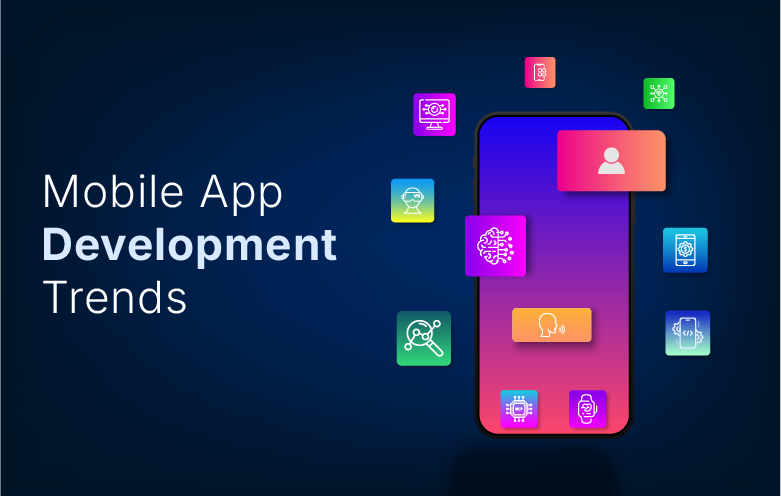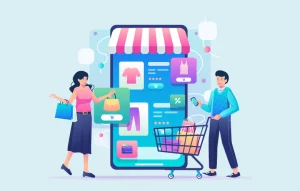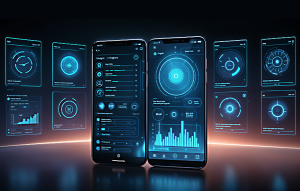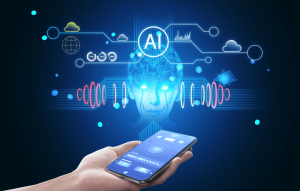Every business today is in the middle of a digital colosseum, battling with one competitor or the other. Do you want to thrive in this competitive arena? Being at par mobile app development trends and their earliest adoption can boost your business to unprecedented heights.
Whether a small start-up or a big enterprise, all have adopted emerging technologies to achieve unprecedented success in the digital era. But have you ever wondered how? Once you realize the potential of mobile app technology it is possible. As mobile phones are widely used, people now rely on them for various purposes like finance, fitness, entertainment, shopping, and many more. It has become the only practical solution to stay connected with users.
Some stats that prove mobile app development is beneficial for businesses:
- A commanding 89% of time spent on mobile devices is attributed to time on apps. Just 11% of mobile minutes are spent on mobile web browsing. -Techlaze
- Mobile users spent an unprecedented 4.2 trillion hours on apps last year, averaging 3.5 hours per day per user. -The Indian Express
- 87% of teens said they used Instagram at least once a month, up from 80% a year ago. -Business Insider
- In-app purchases amounted to $25.5 billion for mobile games. -Investopedia
Rapid advancements in technology, shifting user expectations, and growing market trends are reshaping the mobile app development space. This transformation is significantly changing how consumers use digital platforms and services. Mobile apps act as the digital handshake between the user and their devices. They not only perform different array of functions but also elevate users’ digital experience with these products and services. In this blog, we will discuss the top mobile app development trends in 2025.
Let’s discuss the top mobile app development trends in detail
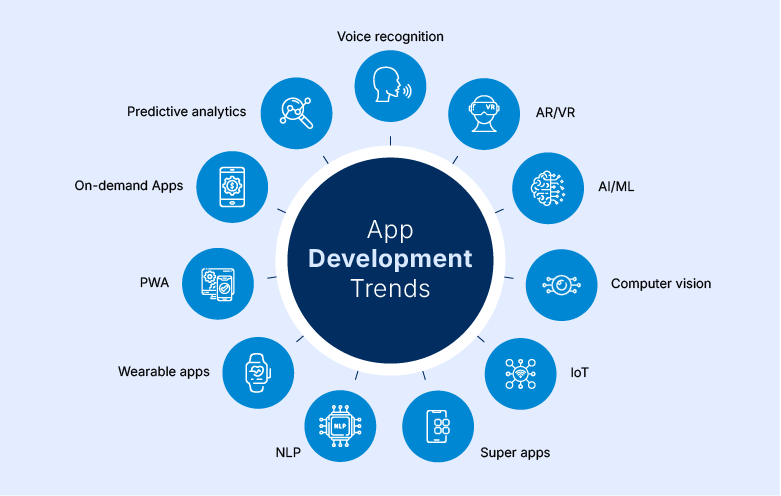
1. Voice-enabled applications or voice recognition
The future of mobile app development is impacted by voice recognition technology. Rather than typing, users can now use voice commands for placing orders, controlling lights, or searching for anything on the browser. Well, this is an emerging reality. Voice and speech recognition apps are gaining popularity, offering users a more convenient and seamless experience.
Therefore, the development of voice-enabled applications allows businesses to redefine user interactions and gain a competitive edge. By integrating advanced natural language processing (NLP) and voice recognition technologies, these applications offer hands-free navigation, enhance search capabilities, and expand control features.
2. AR and VR for an immersive experience
AR and VR are revolutionizing the mobile app development landscape. AR technology overlays artificial objects into the real world, while virtual reality immerses users in virtual environments. The technology has excelled in enhancing experiences like virtual tours, training, and entertainment. These technologies deliver immersive experiences, blurring the boundaries between real and virtual realms.
Consumers want to engage with the products or services they are thinking of buying. However, several constraints make it difficult to facilitate this assessment. With the ability to let consumers experience products virtually before purchasing, AR and VR technology is becoming a key tool for brands aiming to enhance user experience. Tech leaders like Apple, Google, and Meta were quick to implement it, recognizing its impact early. Additionally, apps like Snapchat, Google Maps, IKEA Place, Yelp, and Quiver leverage AR and VR for interactive features.
The industries are witnessing emerging trends like:
- The metaverse
- Augmented reality glasses
- Autonomous vehicle powered by AR/VR
- Remote assistance
- AR- based navigation
These technologies will become mainstream in mobile app development trends and offer exciting opportunities for developers and users in the upcoming years.
3. AI and ML integration
AI and ML in mobile app development are gaining popularity and are experiencing a paradigm shift in the last few years. These technologies played a vital role in elevating innovation, automation, and personalization to the next level. The use of AI in mobile app development has gone beyond this.
With the increasing demand for AI and ML in diverse industries from e-commerce to fintech, insurance to health sector, the developers are leveraging these technologies to create more innovative and customer- centric apps to enhance their experiences.
Trends in AI and ML:
- AIOps
- MLOps
- Explainable AI
- Generative AI
- Agentic AI
The AI market is expanding and with the increase in the number of mobile users every year, entrepreneurs have also realized the significance of mobile applications. Hence, it has become imperative to adopt AI solutions for your business growth. It not only optimizes business processes but also drives market value.
4. Computer vision
Computer vision algorithm plays a vital role in mobile app development, offering various functionalities and features that recognize and classify objects.
- Image recognition: The algorithm aids in capturing images, recognizing, and categorizing objects, scenes, and text through the device’s camera. The technology has various applications such as barcode scanning, image search, and automatic photo tagging in social media apps.
- Facial recognition: Today’s technology has found a unique venue in digital identity verification by making use of the distinctive facial features of an individual. Using facial recognition, users can unlock their devices, confirm payments, access mobile banking, and verify their identity securely.
- Gesture recognition: It interprets user gestures to control interfaces, play games, and navigate content without physical touch, thereby enhancing user interaction and delivering a more intuitive user experience.
- Object tracking: Advanced algorithms help in tracking the movement and position of an object. This capability has found application in fitness, augmented reality games, and traffic monitoring for security purposes.
- Medical imaging: Reading medical images such as X-rays, MRIs, and CT scans is highly prone to human errors.

A Guide to Medical Imaging Using Computer Vision – Unlock insights into how AI-driven computer vision is transforming healthcare diagnostics.
Computer vision augments analysis of these images imparting great speed and accuracy. It further simplifies diagnosing diseases, detecting abnormalities, and monitoring patient health remotely.
Dive into the future of retail with computer vision! This powerful technology personalizes shopping experiences, streamlines operations, and unlocks a new era of intelligent commerce. Explore use cases like shelf restocking alerts, virtual try-on, cashier-less stores, and more.
5. IoT-enabled app integration
IoT is a network of interconnected devices that communicate effortlessly with other devices and perform tasks autonomously. These devices are equipped with sensors and software so that organizations can collect data and analyze real-time performance, remote monitoring, and location tracking etc. It also enables businesses to gain insights from their data to enhance operations.
Benefits of IoT implementation in mobile app development:
- Enhances operational efficiency
- Increase safety and regulatory compliance
- Cost savings
- Generate new revenue opportunities
- Sustainable competitive edge
Businesses can leverage this technology for accurate asset monitoring, transportation route, and many other activities. With integration of IoT becoming a standard business practice, companies now experience better efficiency, higher productivity, and an improved customer experience, helping them stay ahead.
6. Increasing popularity of super apps
The introduction of super apps is a significant trend in the software technology sector. It is an ecosystem of applications that are integrated seamlessly under a single platform. It offers a wide range of core features with access to independently developed mini applications. Surprisingly, organizations are now inclined towards single-purpose apps as comprehensive solutions.
More importantly, super apps have problem-solving capabilities, they are mobile-friendly, and address customer pain points, shifting expectations, and social problems.
7. Natural language processing (NLP)
NLP can enhance the capabilities of mobile apps in understanding and processing human language. This advancement will improve functionalities like voice search and virtual assistants, making interactions more intuitive and efficient.
NLP can facilitate more accurate and responsive interactions as apps will understand and respond better to the spoken commands and queries. Further, Natural language processing (NLP) can facilitate personalized user experiences based on analysis and adaptation to individual language patterns and preferences. Generally, NLP can be a critical aspect in developing the capabilities and user-friendliness of mobile applications.
8. App development for wearable devices
As wearable technology continues to advance, it is pushing mobile application development toward new possibilities. Devices like smartwatches, fitness trackers, and smart glasses are revolutionizing user interactions, making tailored app experiences more important than ever.
Why wearable app development matters:
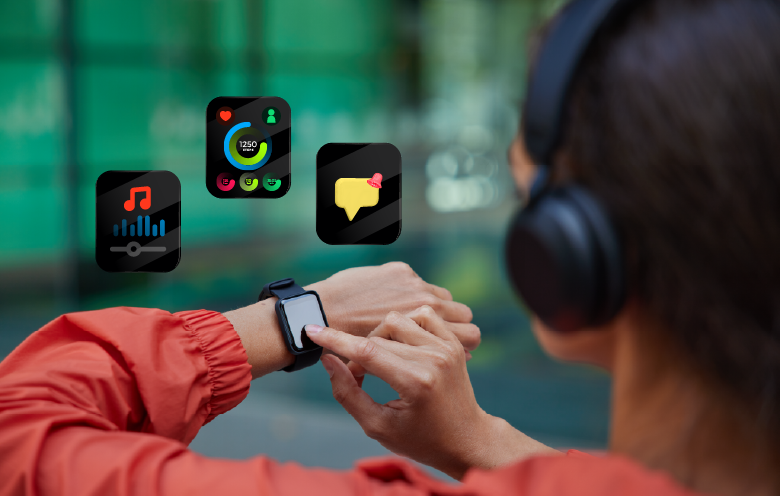
- Health and fitness monitoring: Wearable devices continuously collect data like heart rate, sleep patterns, and daily activity levels. The associated apps process this data into actionable metrics, helping users achieve their wellness goals.
- Real-time notifications: Modern-day users do not have their mobile devices with them all the time. Yet they want to always stay connected and in control of their communications. These apps provide seamless access to notifications, alerts, and updates, keeping users connected without needing their phones.
- Hands-free convenience: Wearables provide an ergonomic experience that users enjoy, allowing them to stay connected to their digital environment through minimal interaction with their devices.
As an enterprise mobile app development company, meeting the needs of wearable technology requires a focus on lightweight design, seamless integration, and user-centric interfaces to deliver experiences that enhance mobility and convenience.
9. Progressive web apps (PWAs)
Progressive Web Apps have emerged as a revolutionary step in digital experiences. Whether the comprehensive of the web experience, or the versatility of the mobile apps, PWAs combine the best of both worlds to deliver the best experience to the users. Their ability to offer seamless and immersive user experiences is a complete game-changer.
Key benefits of PWAs:
- Offline accessibility: PWAs cache essential elements and allow their users to interact with the system even without an active connection.
- Cross-platform compatibility: They perform optimally across devices and operating systems. This helps in delivering a seamless experience while ensuring low costs and reduced time investment.
- Improved performance: PWAs load very quick which minimizes bounce rates. This enhances browsing fluidity, even on weaker network connections.
- No installation required: PWAs can be easily accessed through browsers. Thus, they allow seamless access without requiring app installations.
Twitter, Pinterest, and Starbucks have used PWAs to improve engagement and expand their reach, making them a preferred option for businesses aiming to improve mobile apps.
10. On-demand app solutions
Several industries are being transformed by on-demand app solutions, which provide quick access to goods and services. From food delivery to healthcare, these apps meet the rising need for convenience and speed.
Features of on-demand apps:
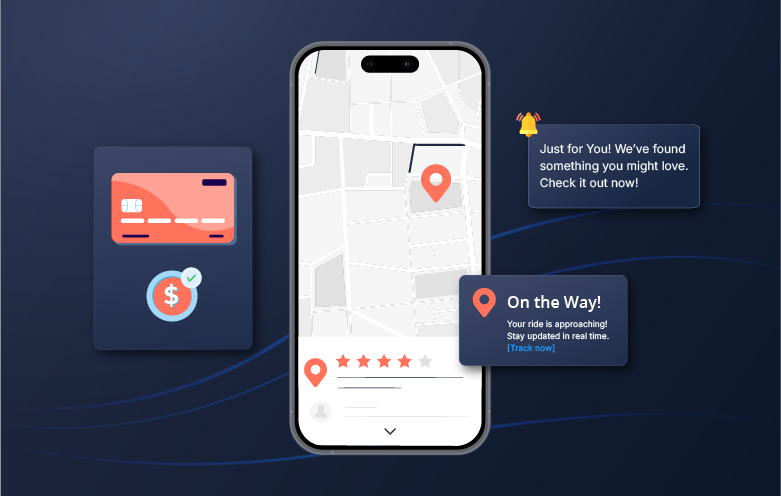
- Real-time tracking: Consumer mindset has grown to be more curious with the rise of quick commerce. Today’s consumer wants to be on top of the whereabout of their purchase with each passing minute. Real-time tracking provides users with latest updates on the status of their orders or services.
- Instant payments: Modern consumers are more open to in-app purchases but highly value a seamless experience. These transactions become effortless with integrated payment gateways.
- Personalized recommendations: Consumers lean towards making a favorable action in the midst of a personalized experience. On-demands apps take help of AI-driven insights to deliver a hyper-personalized experience based on user history.
- Scalability: As more users join and services increase, on-demand apps can adjust easily.
On-demand app solutions are being adopted by industries like logistics and education to boost efficiency and customer satisfaction.
11. Predictive analytics
Predictive analytics is helping mobile apps by leverage data to forecast user behaviors and preferences and tranforming their experiences. It leverages the capabilities of AI, ML, and big data, channeling that knowledge to enhance business efficiency through informed decisions and hyper-personalized experiences.
Applications of predictive analytics in mobile apps:
- Enhanced customer experience: Today’s smart apps offer tailored recommendations after assessing user data and history. Such recommendations include anything from personalized shopping suggestions to customized fitness plans.
- Proactive maintenance: Predictive analytics in IoT-enabled apps identifies potential issues in connected devices before they occur.
- Fraud detection: Financial apps have made a great use case for themselves by detecting unusual patterns and mitigate risks in real-time using predictive models.
- Market insights: Intuitive apps leverage data insights and analyze patters. This information is leveraged to predict market shifts and enhance business planning.
Mobile apps enhanced with predictive analytics not only engage users more effectively but also deliver critical insights that give businesses a competitive edge in the data-driven era.
Leverage mobile app development services now!
The mobile market has experienced a massive elevation in the last few years. The mobility solution is becoming a motivating factor to bring innovations in mobile app development trends. Businesses have realized the importance of mobile and web-based app development and have started implementing it to:
- Enhance productivity
- Improve customer satisfaction
- Engage a broader audience
Custom mobile apps are revolutionizing supply chain management by offering greater visibility, automation, and efficiency. However, achieving the best results requires expertise in developing tailored solutions that meet specific business needs. Softweb Solutions, with its proven expertise in mobile app development services and a pool of skilled mobile app developers, delivers cutting-edge mobile solutions to enhance supply chain performance. Increase your business efficiency—get in touch today to transform your supply chain!


